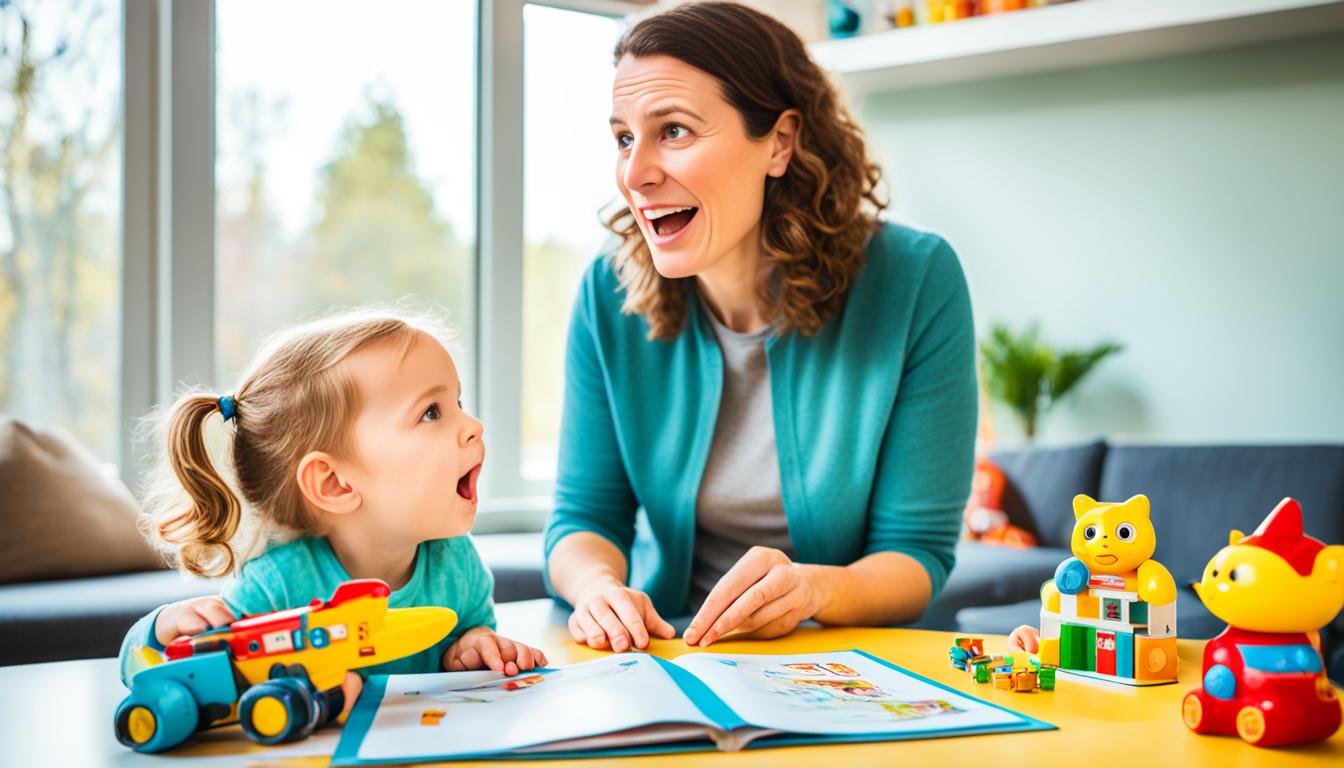Have you ever felt a lump in your throat when you knew you had to talk to your child about a sensitive issue? You’re not alone. Parenting means dealing with tough conversations that can feel overwhelming. Kids look to us for answers and support on complex topics.
Remember when you wondered how your parents handled these talks? By using Positive Parenting and open communication, you can turn these tough topics into lessons. Sesame Workshop offers resources on tough subjects like trauma, grief, and emergencies.
Open and honest talks help kids grow strong. They learn about the world and how to handle its challenges. Dr. Robyn Silverman, a child development expert, shares tips in her book “How to Talk to Kids About Anything.”
Talking about tough topics helps kids avoid wrong ideas and feel supported. Creating a safe space for these talks strengthens their emotional smarts and your relationship.
Being a good listener and speaking wisely builds trust. Starting these talks early makes them a normal part of life, not something to dread.
Key Takeaways
- Creating a safe space for conversation is crucial in fostering trust.
- Utilize resources like Sesame Workshop for guidance on various tough topics.
- Engaging in Honest conversations helps children understand and cope with difficult issues.
- Dr. Robyn Silverman’s advice can be a valuable tool for parents.
- Active listening and respecting children’s opinions strengthen the parent-child bond.
The Importance of Discussing Tough Topics with Children
Talking about hard topics with kids is key to helping them understand the world and their role in it. Studies show that kids who talk openly with adults about these issues are more likely to ask for help when they need it. This openness helps kids develop Emotional Intelligence and builds strong family bonds and resilience.
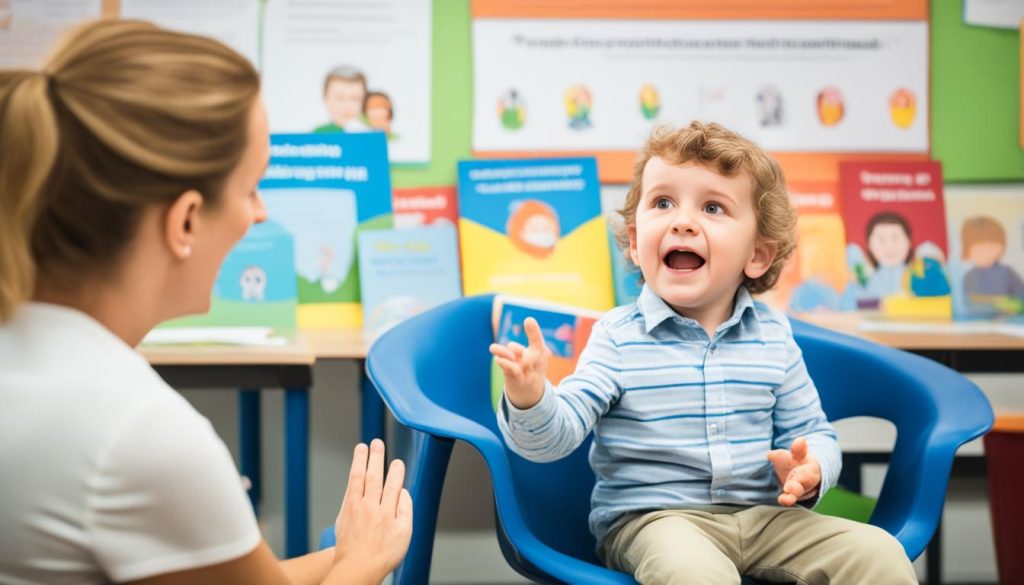
Building Emotional Trust
Building trust is crucial when talking about hard topics with kids. When they feel they can share their worries with parents or caregivers, they feel supported. A recent survey found that 70% of kids want honest answers when they ask about tough topics. This honesty helps kids deal with complex feelings safely.
Strengthening Communication Skills
Talking about tough topics helps kids improve their communication skills. For example, kids between 10-12 often turn to their parents for advice on issues like sex, violence, and drugs/alcohol. These conversations help kids share their thoughts and feelings better, which is important for growing up independently.
Enhancing Emotional Intelligence in Children
Talking openly about hard topics boosts Emotional Intelligence in kids. Research shows that open talks help kids solve problems and bounce back from tough times. These discussions also teach kids to understand and manage their feelings and empathize with others. By talking with kids about these topics, parents set the stage for good communication as they get older.
| Age Group | Primary Guidance Source | Challenges Faced | Children’s Preferences |
|---|---|---|---|
| 10-12 | Parents | Parents feeling “unprepared” | Straightforward and honest answers |
| 13-15 | Parents and peers equally | Different impressions about conversations | Transparency and trust in communications |
Understanding these points helps parents handle tough topics better. It helps build emotional trust and supports their child’s growth.
Choosing the Appropriate Time and Place
It’s key to pick the right time and place for tough talks with your child. Making sure they feel important and heard changes how the conversation goes. Look for a time with few distractions and a comfy setting for deep talks.
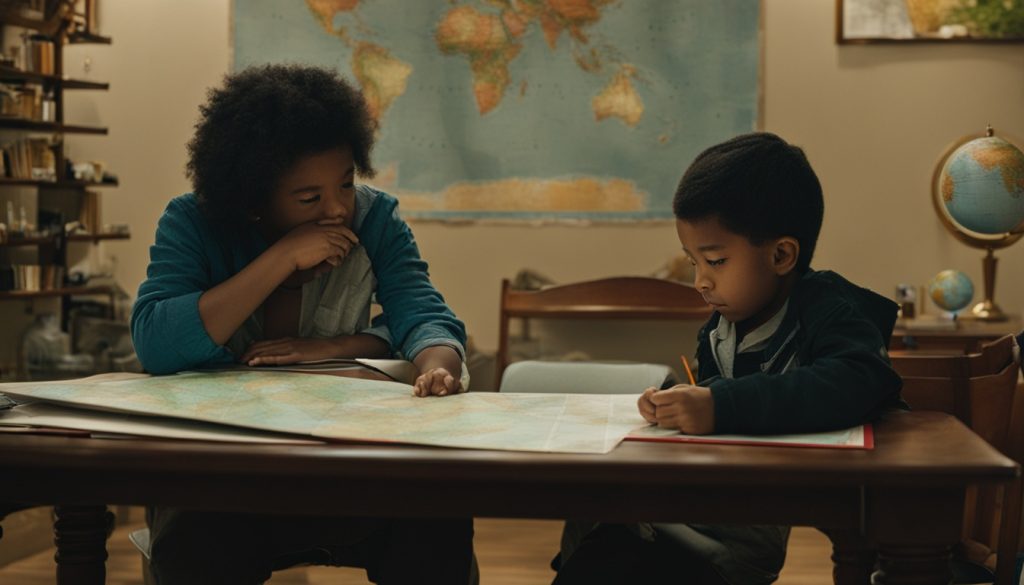
Finding a Quiet Moment
Getting a quiet moment helps you talk to your child without interruptions. Studies show that special time with kids boosts their confidence and helps them grow. When talking about screen time, it’s easier to set clear rules if everyone is focused and not distracted.
Try talking during relaxed times like after dinner or on a walk. These moments can make your child happier and more calm, making it easier to talk about hard topics.
Creating a Safe Space for Conversations
Having a safe space for talking is crucial for good parent-child chats. This means choosing a comfy spot where your child feels safe. Regular special time helps kids grow strong for the teen years, manage feelings, and learn important social skills.
Fun activities like word games or making jokes can make the atmosphere more chill. Outdoor play, like going to the park, is great for fun and exercise, and it’s a good time for deep talks.
By focusing on setting boundaries and managing screen time, parents can make a space for open talks. Tailoring activities to your child’s nature makes these chats fun and useful.
Understanding Age-appropriate Communication
Talking to kids about tough topics means adjusting how you talk to them. This makes sure they can understand and react well. The way you talk changes a lot based on the child’s age, from toddlers to teenagers.
Talking to Toddlers and Preschoolers
For toddlers and preschoolers, keep it simple. Use easy words and talk about feelings, not hard ideas. Encouraging creativity helps make hard topics clearer. Make a safe space for them to learn responsibility early.
Don’t give them too much info at once.
Engaging School-age Children
Older kids can handle more complex talks. They start to see cause and effect, making tough topics more interesting. Talk to them by asking big questions and really listening to what they say.
This helps with social skills and thinking deeply. Praise and rewards can make them want to keep talking well.
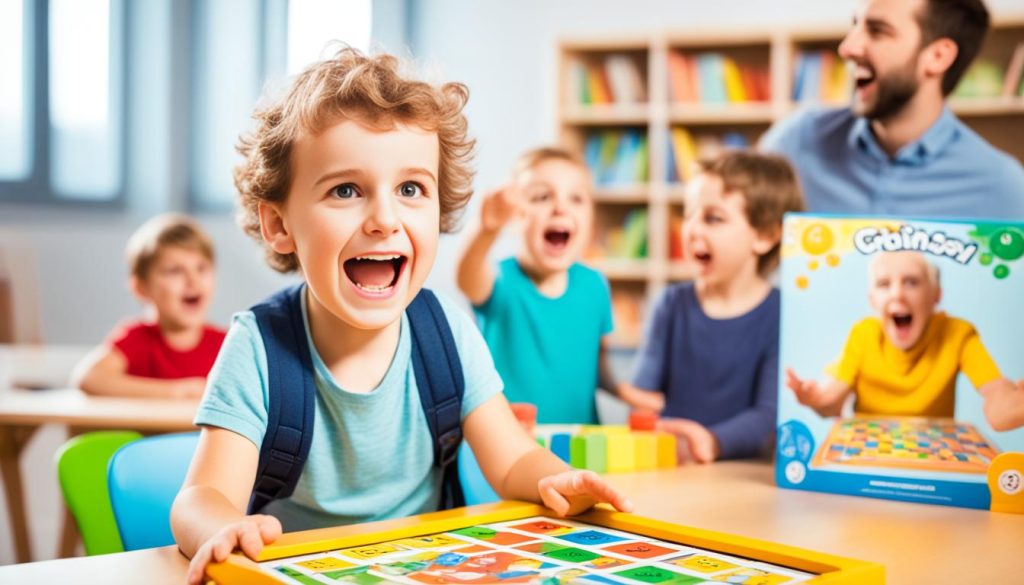
Addressing Pre-teens and Teenagers
Talking to pre-teens and teens means they can think deeply and make moral choices. They can handle complex talks and should be able to share their thoughts freely. Make sure they feel safe to talk without fear of judgment.
This stage is key for teaching responsibility and growing empathy. Use guides like this helpful guide to make sure your talks fit their age and work well.
How to Explain Trauma and Tragedy
Explaining trauma and tragedy to kids needs a careful balance. It’s important to be truthful but also consider their age. Kids react differently to traumatic events. So, we must use the right strategies, keep communication supportive, and help build their self-esteem.
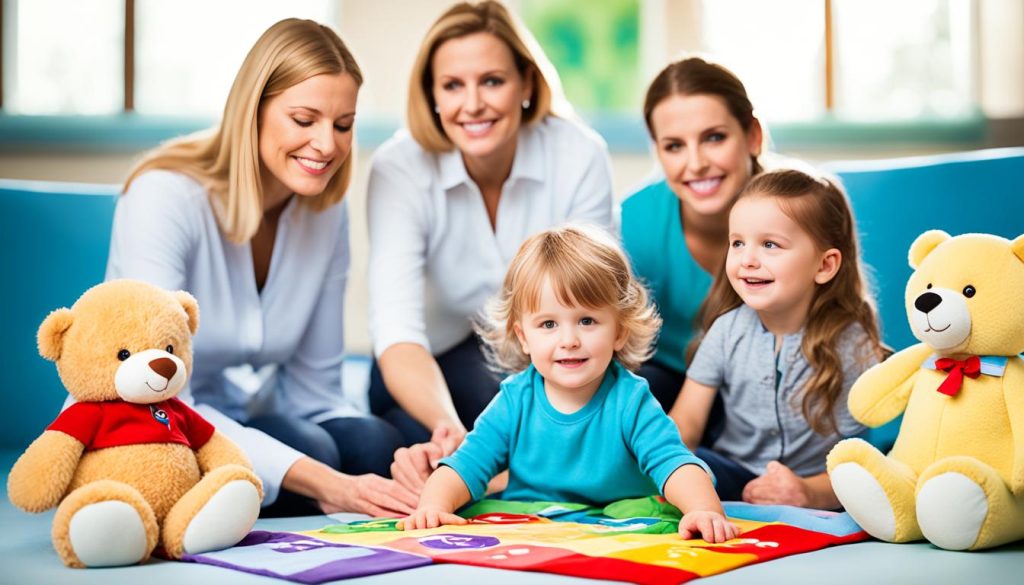
Right after a disaster, kids might seem fine at first. But as time goes on, they may show more signs of distress. Young children, ages 2 to 5, might talk a lot about the event, throw tantrums, cry more, feel more scared, and have trouble with eating and sleeping. Kids with special needs might need more time and simpler explanations.
Traumatic events can cause kids and teens to act out, feel scared, or have trouble sleeping and focusing. It’s important to support them and understand their reactions as they try to cope.
Kids may feel confused, worried, or sad after a traumatic event. They might pull away from friends or start acting out. They could also get headaches or stomachaches. It’s key to talk to them, keep routines, and avoid things that remind them of the trauma.
Parents worry about their kids’ safety, but the chance of harm from disasters or violence in the U.S. is small. Still, it’s good to be ready to answer tough questions with help from trusted friends or mentors.
Creating a safe space that values self-care and open talk helps kids feel better after trauma. Showing them how to handle emotions can make them feel safe and supported.
Encouraging kids to express their feelings and getting help from mental health experts if needed is crucial. These steps help build a strong support system for your child after trauma. They also help with discipline and your child’s overall well-being.
Addressing Sensitive Topics like Divorce and Addiction
When talking about tough topics like divorce and addiction, it’s key to give kids lots of love and support. Use resources to help your family adjust and keep talks respectful. This helps kids feel safe and supports positive parenting and handling sibling issues.
Talking About Divorce
Divorce can really hurt kids, so it’s important to keep things stable for them. Lisa M. Hooper from the University of Louisville found that kids can get hurt if they’re seen as “confidants” instead of just kids. This can lead to mental health problems like feeling sad or anxious. So, it’s important to keep clear lines between parent and child roles.
- Creating routines and stability can help ease kids’ pain during divorce.
- Talking openly about divorce at the right level is key as kids have different questions and feelings.
- Talking about feelings helps prevent them from building up inside.
- Listening to kids and understanding their feelings helps everyone feel more respected and empathetic.
- Co-parenting with similar rules helps create a safe space for kids to grow emotionally.
| Key Factor | Impact on Children |
|---|---|
| Stability and Structure | Greater sense of security and less emotional distress |
| Open Communication | Improved ability to express feelings and feel less guilty |
| Co-Parenting | Boosts self-esteem and mental health |
| Parental Self-care | Helps support children through tough times |
Handling Conversations on Parental Addiction
Talking about addiction needs to be done with care and truth. Kids dealing with addiction often struggle with codependency and emotional issues. It’s important to explain things in a way they can understand without scaring them.
- Create a safe space for talking where kids feel heard and valued.
- Be honest but use language that fits the child’s age and understanding.
- Keep reassuring them and telling them their feelings are okay.
- Encourage talking and regular check-ins to help them deal with their feelings.
Building a home full of respect and empathy helps kids handle parental addiction better. Use positive parenting by praising their efforts and setting clear rules. This makes your family supportive and understanding.
Helping Children Cope with Grief and Loss
Helping kids deal with grief means understanding how they grieve and offering love. When a pet dies, it’s often a child’s first experience with death. It’s important to explain things clearly to avoid confusion.
Kids grieve in their own way, which can be different from adults. They might not fully understand death or show their feelings clearly. They might act younger or wet the bed. It’s good to let them talk about their feelings and share your own grief.
Teaching kids to be grateful helps them bounce back emotionally. Focus on happy memories and the good times with those who are gone. Keeping daily routines helps kids feel safe and secure, which is important after a loss.
The person closest to the child should tell them the sad news, even if they’re also sad. This helps the child feel supported. Explaining why someone died in a way they can understand helps them make sense of it.
Encouraging creativity in kids is key when they’re grieving. Activities like drawing, telling stories, or writing to the loved one who passed away help them express feelings. These activities help them cope and heal emotionally.
When a grandparent dies, it’s something kids often face. It’s important to talk about it in a way they can understand. Having extra support from family or friends can be a big help, especially after a tough loss like suicide or overdose.
Keeping daily routines and talking openly while encouraging creativity creates a caring space. This approach helps kids heal and builds a stronger bond with their parents. It also helps them become more resilient when facing hard times.
Managing Conversations About Violence and Emergencies
Talking about violence and emergencies with your kids is key today. It can be tough to handle their tantrums during these talks. But, with the right steps, you can help them understand and deal with it well. It’s important to give them accurate info and make them feel safe.
Children ages 1-5 often find it hard to handle change and loss. Very young kids need lots of hugs and words of comfort during tough times.
When you talk about these big topics, think about the Growth Mindset for Kids. Encourage them to ask questions and share their feelings through talking, writing, or drawing. This helps them deal with their emotions in a healthy way.
After a traumatic event, young kids might change how they eat and sleep. Getting enough rest is key for their emotional and physical health. Lowering your expectations for their behavior and performance can also help them cope.
Here are some key tips for managing these conversations:
- Give them a safe and calm place to talk about their fears and worries.
- Be honest but explain things in a way they can understand to avoid scaring them.
- Tell them they are safe and that their loved ones are safe too.
- Let them share their feelings and offer comforting routines.
- Use stories and simple examples to explain complex topics.
When dealing with these tough talks, consider this table for different responses and ways to cope:
| Age Group | Common Responses | Coping Strategies |
|---|---|---|
| 1-5 Years | Regression to earlier behaviors | Provide cuddling, verbal support |
| 6-11 Years | Fear of darkness, strangers | Reassure safety, maintain routines |
| 12-14 Years | Abandon chores, risky behaviors | Encourage expression, provide structure |
Talking about violence and emergencies is crucial for your child’s emotional health. With preparation, sharing facts, and support, you can handle these topics well. This helps raise a resilient and well-adjusted child.
Parenting and Raising Kids: Using Stories and Analogies
Parenting and raising kids can be tough, but stories and analogies help a lot. They make hard topics easy for kids to understand. Storytelling teaches morals and values in a fun way. Analogies make complex ideas simple, helping kids learn for life.
The Role of Storytelling in Difficult Conversations
Storytelling makes it safe and easy to talk about hard topics with kids. For example, stories can show the difference between being rude and polite. This helps kids learn good manners and respect.
Using Analogies to Simplify Complex Issues
Analogies make hard subjects easy for kids. For instance, comparing society to a garden with different flowers teaches about diversity. It shows that everyone is unique and adds to the beauty of the world.
Today, parents must blend old values with new ways. They need to choose which traditions to keep and which to change. Stories and analogies help connect the past and present. They let parents share good values while solving old problems. This way, kids learn to handle their feelings well and be kind.
| Traditional Parenting Challenges | Modern Parenting Solutions |
|---|---|
| Avoidance of tough topics | Utilizing stories and analogies for better communication |
| Intergenerational emotional burdens | Fostering emotional intelligence through open dialogue |
| Maintaining a balance between old and new practices | Adapting and integrating effective modern strategies |
Using stories and analogies in parenting makes hard talks easier and enriches your child’s learning. It helps them grow into a caring, smart, and strong person. They’ll be ready to face life’s challenges with wisdom.
Reassuring and Providing Emotional Support
Parents play a key role in supporting their kids, especially during tough times. The American Academy of Pediatrics says it’s vital for parents to be in tune with their kids’ feelings. With about 21 percent of U.S. kids facing mental health issues, it’s crucial to make them feel safe and emotionally strong.
Creating a caring environment means showing love, being there for your kids, and paying attention to them daily. About 60% of kids form strong bonds with their parents through loving actions and caring responses. Spending quality time and talking openly helps build a safe space. This not only helps with work-life balance but also supports kids’ growth in all areas.
It’s important to notice when kids are feeling down and get help when needed. Sadly, only 20 percent of kids with mental health problems get treatment because there aren’t enough mental health workers for kids. Having a support system and acting early can make a big difference. Talking with kids, listening to them, and teaching them to be resilient and hardworking helps them deal with challenges. Parents should aim to close emotional gaps and strengthen their bond with their kids. This way, kids grow up confident and ready to tackle life’s hurdles.
FAQ
What resources can help in talking to kids about tough topics?
Why is it important to discuss tough topics with children?
How can you choose the right moment and setting for discussing tough topics with your child?
How should discussions be tailored to children’s age and development?
What are effective ways to explain trauma and tragedy to children?
How should parents address sensitive topics like divorce and addiction?
What strategies help children cope with grief and loss?
How can parents manage conversations about violence and emergencies?
What is the role of storytelling and analogies in parenting?
How can parents reassure and provide emotional support to children?
This post contains affiliate links. If you click on a link and make a purchase, I may earn a small commission — at no extra cost to you. Thank you for supporting this blog and helping me keep the patterns free! Read the full Affiliate Disclosure & Transparency.
